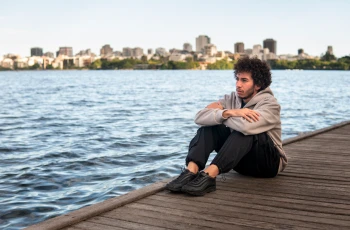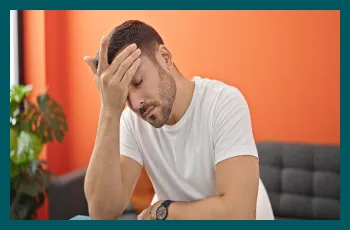Why do I feel the need to distance myself from everyone?
Written by editorial staff writer at Hola. Medically reviewed by Amira Shah, MA in Counselling Psychology, Registered Psychotherapist. Blog updated on 22 October, 2025. Originally published on 26 June, 2025.

Contents

Overview
Ever find yourself ignoring calls or just wanting to be left alone — even when nothing's wrong? You're not alone. Many Australians experience this urge to pull back. Sometimes it's your mind's way of asking for rest, but other times it can signal deeper emotional strain. Knowing the difference can guide you toward the best next step—whether that means taking a break or seeking assistance.Why do I feel the need to distance myself?
Pulling away from people doesn't necessarily mean you dislike them. Often, it's your way of managing stress, overload, or old emotional fatigue. Amira, a registered psychotherapist based in Canberra mentions 'For some, this pattern starts early — as a way to cope with rejection or emotional neglect. If you grew up with emotionally distant parents or felt unseen, withdrawing may have become a survival skill that still shapes your relationships today.'When needing space turns into isolation
Needing space is normal. But if you notice yourself cancelling plans, ignoring messages, or staying silent in group chats for days or weeks, it may be more than just recharging. You may start feeling lonely, unheard, or emotionally numb. That's when it can turn into emotional distancing.Healthy solitude vs emotional withdrawal
Let's see the difference:| Healthy solitude | Emotional withdrawal |
| A conscious choice to rest and recharge | An automatic reaction to stress or pain |
| Feels peaceful and refreshing | Feels heavy, lonely, or numb |
| Helps you reconnect with others | Keeps you distant, stuck, and disconnected |
| Linked to self-care | Linked to emotional avoidance |
Ready for positive change? Start your mental health care plan here.
Book an appointment
Fully bulk-billed, across Australia.
When needing space is part of self-care
Sometimes, stepping back isn't a bad thing — it's self-care. It allows you to reset your emotional boundaries, reflect, and restore energy. It's absolutely okay to say "no" to things that drain you mentally. Expert Psychotherapist Amira comments - Taking space doesn't mean disconnection, it's how you return with more balance and clarity.Signs it might be more than just a break
Sometimes, emotional distance signals a deeper issue. Watch for these warning signs:- Avoiding family and friends for weeks
- Feeling emotionally numb or shut down
- Constant low mood or tiredness
- Appetite or sleep changes
- Losing interest in things you used to enjoy
- Feeling hopeless or disconnected
Common reasons you might feel this way.
You might find yourself pulling back for different reasons — from emotional exhaustion to fear of being hurt. Here are a few common ones:- Burnout (from work, caregiving, or emotional load): Stress from work or personal pressures can leave you feeling exhausted and uninterested.
- Social fatigue: Constant social interactions deplete your energy.
- Unresolved trauma: Past experiences cause emotional shutdown as a protective measure against further pain.
- Fear of rejection: Avoiding closeness in case you get hurt.
- Low self-worth: Feeling disconnected or like a burden to others.
Steps to reconnect with others
Recovery takes time, and it's okay to start small. Try these simple steps:- Start journaling. Jot down how you're feeling; even a few words can help.
- Reach out to a trusted person
- Say yes to a small plan, like a coffee or a short walk.
- Talk to your GP or a therapist for guidance
- Reconnect with simple pleasures: music, pets, nature, or art.
When you should consult with a doctor
If emotional withdrawal is disrupting your daily life, it's time to get professional help. Seek support if you:- Feeling detached most days
- Avoid people, even when you crave company.
- Struggle to sleep, eat, or focus.
- Feel persistently low or emotionally flat. You don't have to wait until things worsen – early support makes recovery smoother.
How Hola Health helps in mental health support
Hola Health makes it easy to get started with mental health support for people across Australia. With Hola Health, you can:- Speak with a GP online
- Get a Mental Health Treatment Plan (MHTP)
- Access up to 10 subsidised therapy sessions via Medicare
- Discuss symptoms like burnout or withdrawal
- Get advice, medication, or referrals if needed
Conclusion
Wanting space doesn't mean something's wrong — it's your mind asking for rest. But if distance starts feeling lonely or endless, support is available. Reach out to a Hola Health online doctor and take the first gentle step back toward connection and emotional balance.FAQs
Is it normal to feel like I want to be alone all the time?
Sometimes, yes—especially during stress or burnout. But if it feels constant or isolating, it may signal emotional fatigue or low mood.How can I tell if I'm just introverted or emotionally shutting down?
Amira mentions 'Introverts recharge alone and feel refreshed afterwards. Emotional shutdown, however, leaves you feeling numb, sad, or disconnected. 'Can anxiety or depression make me avoid people?
Yes, both anxiety and depression can lead to social withdrawal, low energy, and fear of social situations.When should I talk to a doctor about feeling distant from everyone?
If these feelings persist for several weeks, disrupt your personal life, work, or everyday routines, or come with sadness, worry, or feeling numb, it's time to speak with a doctor or mental health provider. You don't have to wait until it gets worse; getting help early can really help.What's the difference between needing space and isolating?
Wanting space is a healthy, short break to recharge or reflect. Isolating, on the other hand, usually comes from hurt, fear, or numbness and may lead to loneliness or social withdrawal.Can an online doctor help with mental health concerns?
Yes. You can connect with a GP via telehealth, get a Mental Health Treatment Plan, and access therapy, often bulk-billed.What are some small first steps to stop isolating myself?
When solitude brings both comfort and loneliness, taking gradual steps toward connection can help break the cycle. Start small, with something easy:- Step outside for a walk
- Send a message to a friend
- Accept a casual get-together invite
- Join an online group or forum
- Aim to interact with someone daily, even for a moment
Is social withdrawal a sign of depression or burnout?
Social withdrawal can be a sign of both depression and burnout. Depression may lead to isolation due to feelings of sadness, hopelessness, and fatigue. Burnout stems from emotional depletion and mental exhaustion. If you consistently pull away from others, consider speaking with a therapist to gain a deeper understanding of why.What should I do if I feel emotionally numb or disconnected?
Start by accepting the feeling without judgment. Try calming activities like journaling, light exercise, or mindfulness to reconnect. Talking to a therapist can help reveal underlying causes such as stress, trauma, or depression, and guide you back toward emotional clarity and connection. You don't have to go through it alone.Take control of your mental health. Begin your care plan now.
Book an appointment
Fully bulk-billed, across Australia.
What we treat
- Cough
- Nausea & vomiting
- Fever
- Hayfever
- Fatigue
- Sore throat
- Acne
- Hair loss
- Gout
- Eczema
- Rosacea
- Sunburn
- UTI
- Erectile dysfunction
- Contraception
- Morning sickness
- Morning after pill
- Prostate health
- Anxiety
- Depression
- Stress
- Grief & loss
- Antidepressants
- Premature ejaculation
- Asthma
- Blood pressure
- Blood thinners
- Diabetes
- Cholesterol
- Migraines & headaches
- Allergies
- Body ache
- Heartburn & reflux
- Sleep disorder
- Pain relief
- Gastro
Related Articles
What Is Online Therapy? Everything You Need To Know About e-Therapy
February 19, 2026Mental Health
...
Disclaimer
This blog is for general informational purposes only and does not indicate that Hola Health provides all treatments or preventive measures mentioned. It is not intended to be a substitute for professional medical advice. Always seek the guidance of your doctor or other qualified health professional with any questions you may have regarding your health or a medical condition. For emergencies please immediately contact 000. Any medical topics discussed are intended to educate, not to imply availability through Hola Health.
 Facebook
Facebook  X
X  Copy Link
Copy Link



